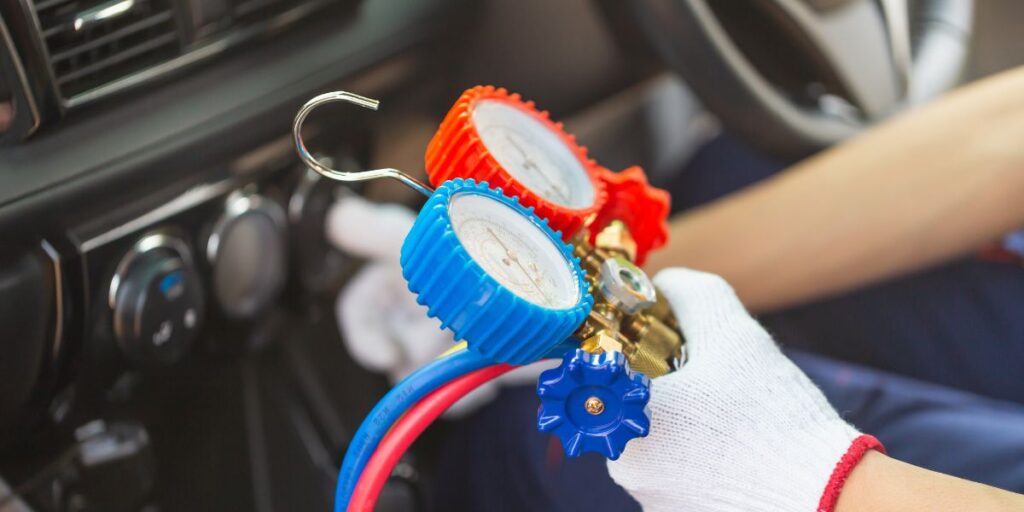What to Expect During a Tune-Up with Your Auto Mechanic
April 2, 2024
Hey there, car fans! Ever heard of a “tune-up” for your ride but are not sure what it means? Don’t fret! We’re here to explain it all. Get ready to learn about the important stuff auto mechanics do to keep your car running smoothly. So, grab your imaginary wrench, and let’s get started!
Understanding the Tune-Up Essentials
1. Diagnostic Check:
The initiation of a vehicle tune-up generally starts with a comprehensive diagnostic test. Auto specialists employ sophisticated instruments that interface with your car’s integrated computer, scrutinizing for any error codes that could signal problems. Think of this as the mechanic initiating a dialogue with your vehicle, decoding its language to pinpoint any latent issues.
Once the diagnostic check is complete, the mechanic can then proceed to inspect and replace any worn-out or faulty components. This thorough examination ensures that all necessary repairs are addressed during the tune-up process, maximizing your car’s performance and longevity.
2. Spark Plug Inspection and Replacement:
Spark plugs are the unsung heroes of your engine’s performance. During a tune-up, mechanics inspect these small yet mighty components. If they’re worn out or covered in deposits, they might recommend replacements. New spark plugs can enhance fuel efficiency and overall engine performance.
In addition to spark plug inspection and replacement, the mechanic may also examine the ignition system, including the ignition coils and wires. This ensures that the engine is receiving the necessary spark for optimal combustion. By addressing any issues with these components, the mechanic further improves your car’s performance and reliability.
3. Air Filter Examination:
One critical element that auto technicians often evaluate during a tune-up is the air filter. An impure or obstructed air filter can limit the engine’s air supply, hampering fuel efficiency and potentially leading to damage. If deemed necessary, the technician might advise replacing the air filter to safeguard optimal engine operation.
Your car needs to breathe, and the air filter plays a crucial role in ensuring it gets clean air. Mechanics check the air filter and replace it if needed. A clean air filter improves engine efficiency and fuel combustion, contributing to better overall performance.
4. Fuel System Inspection:
In addition to these inspections, the mechanic may also inspect the fuel system, including the fuel filter and injectors. This helps to ensure that fuel is being delivered properly to the engine, improving its performance and efficiency. By addressing any issues with the fuel system, the mechanic can help prevent potential problems down the road and keep your car running smoothly.
The fuel system is the lifeblood of your vehicle. Auto mechanics inspect components like the fuel injectors and fuel filters. Cleaning or replacing these parts can optimize fuel delivery, ensuring your engine runs smoothly and efficiently.
5. Checking and Adjusting Ignition Timing:
Auto experts also engage in the crucial task of reviewing and tuning the ignition timing. This procedure ensures that the spark plugs ignite the fuel precisely when they should, optimizing power generation and fuel economy. Misaligned ignition timing could result in subpar performance and elevated fuel consumption. An expertly tuned timing can enhance your vehicle’s overall performance and simultaneously lessen your fuel expenditure.
Precise ignition timing is vital for engine performance. During a tune-up, mechanics check the ignition timing and make adjustments if necessary. This ensures that the spark plugs fire at the right moment, maximizing power and efficiency.
6. Examination of Belts and Hoses:
Throughout a tune-up, mechanics also scrutinize your vehicle’s engine belts and hoses’ health. With time, these belts can show signs of wear or fractures, and hoses may develop leaks. Spotting and replacing these deteriorated components can avert expensive breakdowns and guarantee your engine’s smooth functioning.
Belts and hoses play a role in various engine functions, from running the alternator to cooling the engine. Auto mechanics inspect these components for wear and tear, recommending replacements as needed to prevent unexpected breakdowns.
7. Battery Health Check:
In addition to examining belts and hoses, mechanics perform a battery health check during a tune-up. The battery is an essential component of your car’s electrical system, providing power to start the engine and operate various electrical components. By checking the battery’s voltage and overall condition, mechanics can identify any potential issues or signs of deterioration. This allows them to recommend a replacement if necessary, ensuring that your car starts reliably and all electrical systems function properly.
Nobody likes being stranded with a dead battery. Mechanics check the battery’s condition, cleaning terminals and ensuring proper voltage levels. If your battery is on the verge of retirement, they might suggest a replacement to avoid inconvenient surprises.
Why You Need a Tune-Up
A tune-up is necessary to ensure that your vehicle is running at its optimal performance. It helps to identify and address any potential issues before they become major problems, saving you time and money in the long run. Additionally, a tune-up can improve fuel efficiency and extend the lifespan of your vehicle, making it a worthwhile investment for any car owner.
Now that we’ve peeked under the hood, let’s discuss why a tune-up is crucial for your vehicle:
- Optimized Performance: A well-tuned engine performs more efficiently, providing better fuel economy and power. Regular tune-ups help to maintain the proper functioning of your vehicle’s engine components, such as spark plugs and filters, ensuring that they are clean and in good condition. This not only improves overall performance but also helps to prevent potential breakdowns or costly repairs in the future.
- Improved Reliability: Regular tune-ups catch potential issues before they become major problems, reducing the risk of unexpected breakdowns. Additionally, a tune-up can help identify and address any minor issues that may be affecting your vehicle’s performance, such as misfiring or rough idling. By addressing these issues early on, you can ensure that your vehicle remains reliable for longer periods. Furthermore, regular tune-ups can also help extend the lifespan of your vehicle by keeping all its components in optimal condition.
- Extended Lifespan: Like a health check for your car, a tune-up can extend the lifespan of various components, saving you money on major repairs. Regular tune-ups can prevent major repairs by catching and fixing minor issues before they become more serious and costly. This can ultimately save you money in the long run and help your vehicle last longer.
Finding the Right Auto Mechanic
Finding the right auto mechanic is crucial for ensuring that your vehicle receives proper and high-quality tune-ups. A skilled and experienced mechanic will have the knowledge and expertise to identify any potential issues and address them effectively. Additionally, a trustworthy mechanic can provide valuable advice on maintaining your vehicle’s performance and prolonging its lifespan.
Choosing the right auto mechanic for your tune-up is as crucial as the tune-up itself. Here are some tips:
- Experience Matters: Look for mechanics with a proven track record and experience in handling various vehicle makes and models. This will ensure that they are familiar with the specific needs and requirements of your vehicle. It is also important to consider their certifications and qualifications, as these indicate their level of expertise and commitment to their profession. Additionally, reading reviews and getting recommendations from friends or family can help you find a mechanic who is reliable and trustworthy.
- Check Reviews: Online reviews and testimonials can provide insights into the quality of service offered by a particular mechanic or auto shop. By checking reviews, you can get a sense of the experiences other customers have had and whether they were satisfied with the work done on their vehicles. It is also worth considering any specializations or areas of expertise that a mechanic may have, as this can be beneficial if you have a specific issue or concern with your vehicle.
- Transparent Communication: A reliable mechanic communicates effectively, explaining the necessary repairs or replacements and providing clear estimates before starting any work. This helps to build trust and ensures that you are not surprised by any unexpected costs. Additionally, a reliable mechanic will keep you updated throughout the repair process, providing regular updates on the progress of your vehicle and any potential delays that may arise.
In Conclusion
Understanding what happens during a tune-up empowers you as a car owner. Regular tune-ups not only keep your vehicle running smoothly but also contribute to its longevity. So, the next time you hear that your car needs a tune-up, you’ll know exactly what to expect under the skilled hands of your auto mechanic. Happy driving! 🚗✨
Anthony's Auto Service
Recent Posts



